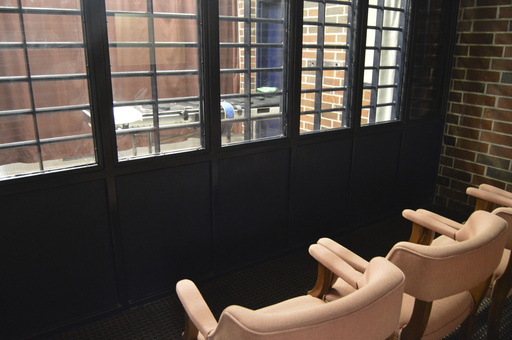COLUMBIA, S.C. — A man on death row in South Carolina, convicted of murder, is taking steps to appeal his case to the state Supreme Court. Marion Bowman Jr., who is slated to be the next inmate executed, claims that his trial attorney lacked adequate preparation and displayed bias toward the victim during the trial.
Bowman’s execution was tentatively scheduled by a court earlier this year, with the Supreme Court currently observing a moratorium on executions for the holiday season. A date for Bowman’s execution could be established as quickly as January 3.
Bowman was sentenced to death for the 2001 murder of 21-year-old Kandee Martin. Martin was found dead from a gunshot wound, her body hidden in a trunk of a burnt vehicle.
In an appeal submitted on Tuesday, Bowman’s legal team requested a reprieve from his scheduled execution in order to conduct a comprehensive hearing. The claim highlights that during the trial, Bowman’s attorney referred to the victim, who was white, as “a little girl,” while labeling Bowman, a Black man, as a “man” despite being only a year younger than Martin at the time of her death.
The prosecution’s case against Bowman primarily relied on the testimonies of friends and family members who provided evidence against him in exchange for plea deals. Notably, allegations of a sexual affair between Bowman and Martin were presented at the trial, although Bowman faced no charges of sexual assault.
During the trial, his attorney, Norbert Cummings, suggested that key to a potential plea was to avoid the death penalty, even though Bowman had consistently maintained his innocence regarding Martin’s murder. This suggestion stemmed from Cummings’ belief that a jury might not be empathetic toward a Black defendant, according to the appeal documentation.
“The attorney’s own biases hindered his ability to advocate for Marion effectively,” stated Lindsey Vann, Bowman’s appeal attorney.
Diving into the specifics of the trial, at a later hearing regarding the potential reversal of Bowman’s conviction in 2014, Cummings made remarks questioning Bowman’s presence in a secluded area at the time of Martin’s murder.
Cummings did not respond to inquiries left at his office.
There were also allegations that prosecutors did not disclose crucial information concerning witnesses who testified against Bowman under plea agreements, including their psychological issues and pending criminal charges at the time of the case. Bowman’s current attorneys argue that this failure could have significantly influenced the jurors’ interpretations of the testimony.
“I have rarely come across a transcript where so many witnesses received deals to testify, and their accounts varied over time, raising questions about their reliability,” Vann stated.
The South Carolina Attorney General’s Office did not respond to this recent court filing. So far, Bowman has exhausted his normal appeal options, with appellate courts consistently affirming his conviction and death sentence.
At 44 years old, Bowman has spent over two decades on death row. His latest appeal also urges judges to take into account the personal growth he has experienced during his time awaiting execution. This includes endorsements from various former prison staff members, who describe him as a supportive presence for inmates dealing with mental health challenges.
Bowman has acted as an intermediary between inmates on death row and prison authorities for several years.
He is now scheduled to be the third inmate executed in South Carolina following the passage of a law earlier this year that protects the identities of suppliers of lethal injection drugs, which had led to a hiatus in executions for 13 years due to drug shortages.
Bowman joins the ranks of Freddie Owens and Richard Moore, who were executed earlier in the year. Alongside Bowman, three other inmates are out of regular appeal options and may face execution as soon as every five weeks beginning in 2025.
Furthermore, earlier this year, a federal judge dismissed a lawsuit filed by the American Civil Liberties Union that sought to permit the recording of Bowman’s plea for mercy via a podcast format from death row.
Currently, South Carolina regulations prohibit on-camera interviews or any recordings of inmate communications intended for public broadcast.



